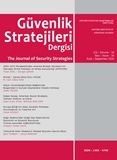Avrupa Birliği’nin Siber Güvenlik Politikası: Kurumsalcılık mı Tutarlılık mı?
The Cyber Security Policy of European Union: Institutionalism or Coherence?
Author(s): Fulya KöksoySubject(s): Security and defense, EU-Accession / EU-DEvelopment
Published by: Atatürk Stratejik Araştırmalar Enstitüsü
Keywords: European Union; Cyber Security; Historical Institutionalism; Coherence; European Union’s Cyber Security Policy;
Summary/Abstract: It is seen that information and communication technologies have been intensely integrated into our lives especially in the recent period. The digital age has been changed and transformed at an unavoidable rate, despite it causes many advantages, but it also brings risks and threats. In fact, cyber-attacks pose an important threat to individuals, institutions and states. In this context, an extremely fragile world composition is encountered and the concept of cyber security comes to the fore. As the issue of ensuring cyber security is extremely important, the European Union (EU) is an actor that accepts threats arising from the digital world and tries to develop strategies and policies to ensure the security of the cyber space. Concordantly, the cyber security policies of the European Union, which has sui-generis content in the international system and gained legal status by Lisbon treaty entered into force on 1 December 2009, are analyzed. In addition to this, the equation arises between the European Union and the cyber security phenomenon has been examined for finding out whether the equation is built on institutionalism, which enables the analysis of the EU's cyber security policy on the basis of formal (institutions) and informal (such as rules, procedures) structures, or consistency.
Journal: Güvenlik Stratejileri Dergisi
- Issue Year: 16/2020
- Issue No: 35
- Page Range: 635-674
- Page Count: 40
- Language: Turkish

